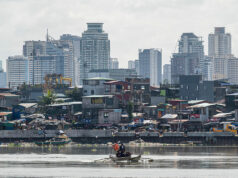IMF sees PHL credit rise easing
CREDIT GROWTH in the Philippines may slow next year, an official of the International Monetary Fund (IMF) said, with such deceleration expected to allay fears of overheating for the Philippine economy.
IMF country representative Yongzheng Yang said the multilateral lender sees private sector loans growing by “around 19%” this year and moderating to 17.4% in 2018.
“We expect that the [credit] growth would start to converge to potential level. With very strong growth over the last couple of years, there should be normalization,” Mr. Yang told reporters on Friday.
The IMF has been upbeat about the prospects of the Philippine economy, even as it has flagged fast credit growth as a key risk due to potential overheating.
The global monetary authority expects Philippine gross domestic product to grow by 6.6% this year and by 6.7% in 2018, driven by robust domestic demand, a recovery in exports and a fiscal stimulus from the government’s infrastructure push.
‘NO OVERHEATING’
In its annual health check on the Philippine economy, the IMF flagged the “combination of high credit growth, buoyant private investment and fiscal expansion without tax reform” as a potent mix for possible overheating.
Bank lending has been growing by double-digit pace, with domestic credit surging by 21.1% in September which was the fastest pace in at least two years, according to latest available central bank data.
At the same time, the multilateral lender said the elevated pace of domestic credit is expected to taper off to more sustainable levels, quelling fears of excessive lending.
“[T]he bottom line is we don’t see the credit growth would continue on the uptrend… Our baseline projection is that it will be normalizing. There will be no overheating; credit growth will go smooth,” Mr. Yang said.
“If there is indeed overheating, you need to tighten monetary policy by raising interest rates… That is, for example, to raise the capital requirement for banks so they won’t lend out that much.”
The IMF remains of the view that benchmark borrowing rates remain appropriate as far as the Bangko Sentral ng Pilipinas (BSP) is concerned, even as it has noted that the regulator should stand ready to tweak policy settings to temper lending activity as needed.
The Monetary Board kept key rates unchanged this month, given within-target inflation and firm domestic economic activity. Rates were kept at 3.5% for overnight lending, 3.0% for the overnight reverse repurchase rate and 2.5% for the overnight deposit rate.
The IMF also backed the BSP’s plan to trim the 20% reserve requirement imposed on big banks, even as the former noted that this needs to be carefully calibrated so as not to unbalance liquidity conditions and stoke inflation. — Melissa Luz T. Lopez



